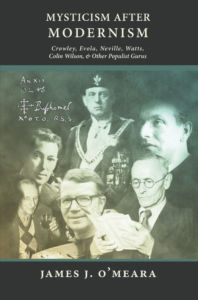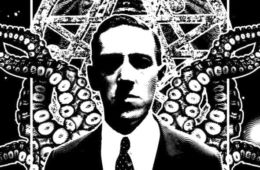How I Became a Demigod — And You Can Too! Rise to Greatness with The Golden One, Part 1
Part 1 of 3
Marcus Follin (The Golden One)
Demigod Mentality
Legio Gloria, 2023
If someone truly believes himself to be blessed by the Gods, it eventually becomes true — this is the power of faith. — The Golden One
Experience has convinced me that an assumption, though false, if persisted in, will harden into fact. — Neville Goddard[1]
If you’re not acquainted with the man calling himself “The Golden One,” he’s happy to fill you in right from the start:
I am, if I may be so bold, quite the specimen. . . . You behold an entity that looks like something sprung out of a myth, with a physique and posture that immediately captures the attention. The skin is of bronze the hair of gold, and the gaze of fire. The eyes reflect the blue of the Baltic Sea, with the same promise of glory. The shoulders are great, and the waist is slim. I am tall and straight; I am a statue come to life. A benevolent smile reaches my lips as I invite you to bask in the sun with me as I share my teachings.
We’ve seen this sort of thing before, from the crap-Nietzschean baby-talk of Bronze Age Pervert’s books and blogs,[2] to backstage rants and leaked confessions from putative “leaders of the Alt Right” or “world historical pan-Aryan philosophers.” One’s instinct is to run the other way, and one’s instinct is usually correct: As Schopenhauer said, in most men, humility is merely honesty. Is that the case here? Let us bask in his sun and see.[3]
Your humble Reviewer was one of the few to whom The Golden One was only a name, connected with a few quotes — some well-taken, some outrageous — and occasional video clips. So, pressing on from this opening speech — to fulfill my duty to you, the Reader — you can imagine my delight to find that The Golden One is fully acquainted with the substance of my writings on New Thought, although apparently not with the works themselves; this in itself adds to the credibility of his metaphysics, as it arises from his own nature and experience. Call it Nordic New Thought.
Chapter One, “Mentality, Magic and Mindset,” defines magic along the same lines as Aleister Crowley’s “Magick”[4] and Neville’s “Simple Method for Changing the Future”:[5]
Magic can be defined as the use of one’s will to cause change in both the subjective and objective universes. A change in the physical realm (objective universe) often has its starting point in a change in the metaphysical realm (subjective universe).[6]
Like Neville, he gives us “a simple formula”:
Create (or receive) a vision, believe in it, work toward it. As the saying goes: Where there is a will, there is a way.
And it’s important to note that the process moves both ways:
You can influence your mind to think certain thoughts. These thoughts will influence your body. A confident mindset can lead to better body posture, which can lead to positive hormonal (biological) changes.[7] These hormonal changes can, in turn, reinforce the confident mindset, thus creating great momentum — a positive upward spiral. Submissive and slave-like body language can do the opposite.

You can buy Julius Evola’s East & West here.
Like Julius Evola and Neville,[8] TGO (as I will refer to him, for simplicity) grasps the implication that one must keep a close watch on what we allow to enter our consciousness:
You can . . . actively choose what you feed both your body and your mind. Just as you must feed your body with good food, you must also feed your mind with good nourishment. What you feed your mind will also determine how well you can control the mind, similar to how your control of your body is altered depending on what you feed it.
One of the things that you can feed your body are one or more kinds of dietary supplements, which TGO is happy to advise on, while also “introducing the greatest supplement available”: “simply the supplement you believe in.” He’s referring to the “placebo effect,” and correctly notes that scientific studies have proven its efficacy; as one would expect if one understands that “the metaphysical (belief) can affect the physical (ones’ physiology).”[9]
TGO selects a metaphor for this from the Pali Buddhist scriptures: “The ascetic can freely choose his thoughts, just like a prince with a chest full of clothes can choose the garment which pleases him the most” — quoted from Evola’s Doctrine of Awakening, but chooses not to align himself with Evola’s fatalistic notion that our options are determined for us by living in the Kali Yuga:
This is not to say that one should ignore the gravity of the situation: at the time of writing, European civilization finds itself in dire straits. However, believing in victory will bring victory closer. Believing that only doom and darkness lie ahead, on the other hand, will put your mind in a passive and defeatist state – making victory less likely.
The important thing to understand is that nothing is set in stone; the course of history can always be altered by individuals of great ambition.[10]
The Owl of Minerva takes flight only at dusk. For The Golden One, Tradition is not a source of excuses for inaction, but a guide to action and a treasury of actionable ideas.[11]
Chapter Two details how the man who would become The Golden One rose to his current Zarathustrian sense of self. Perhaps I should mention at this point that each chapter consists of short passages, from single paragraphs to a couple of pages — rather Nietzschean, come to think of it — in an easy, friendly style, making it easy to assimilate over the course of reading.
As he who would become TGO grew to manhood, a love of football would expand to include Japanese Jujutsu and “unstructured” gym training, both of which proved dead ends.[12] At 16 these were replaced with Thai boxing and Brazilian Jujutsu, “more lethal and effective.” At 19 there was “great training” in the Swedish army, and then he embarked on “the Iron Journey,” culminating in his colleagues voting to award him the title of Latsbrah, in recognition of his “broad and muscular back.”[13]
By now, however, our autobiographer had come to understand “the challenges that Sweden and Western civilization were facing,” and “become enlightened to the fact that Sweden stood on the edge of a precipice — brought about by the transformation of the once homogeneous Sweden into a multicultural society”:
This knowledge, coupled with a healthy patriotism and a desire to live in accord with the heroic ideals I had grown up with (to combat evil, for example), made sure that the path I had taken would eventually lead me beyond the humble origins of the Gym.
Thus was born The Golden One; or rather, that was the start of “a long journey”:
I had created a model in my subjective universe — a metaphysical model that I had to embody. Just as I had sculpted a demigod-like physique with the starting point of my own heroic ideals, so could I ascend to a higher state of being through my will.
In claiming the title of “The Golden One,” I knew I had to work hard to embody the ideals that one would expect from a man bearing such a title. A perfect physique was not enough. First and foremost, an acceptance of responsibility was in order. [This included] presenting a certain lifestyle [as well as] engaging metapolitically [:] taking a stand for European bioculture and civilization.
There is magic in words and names:
My own self-perception then shaped how others came to view me. The way you see yourself is the way others will see you. If you view yourself as a demigod, others will pick up on it.
Of course, this only works if “you can back it up with your physical presence”; to think otherwise is “a sign of delusion.”[14] Yet, “it is always reasonable to view yourself as a man deserving of respect”:
The first change takes place within the reach of your will. The change in character can [then] be seen in how you treat yourself. Do you respect yourself enough to live a disciplined lifestyle? Good, then others will, most likely, also respect you.

You can buy James O’Meara’s book The Eldritch Evola here.
On another level, TGO’s “increasing physical spendour” unlocked — revealed, not earned, because it is a gift of the gods — his divine charisma, leading to a series of public successes: bodybuilding competitions, photoshoots, YouTube videos, and ultimately public speaking engagements; a virtuous cycle of physical training and lifestyle discipline leading to more and more opportunities to engage in metapolitical interventions, and so on.
As above, so below — or as within, so without; so it should be no surprise that the same process repeats itself in the world around us. Chapter Three explores the role of self-image in the life of nations, societies, or races:
Just as your own ideal of yourself influences your decisions and conduct, so too does the ideal of a society influence its form. The reigning narrative is all-important. The story a people tells itself about itself will determine its destiny.
Part of the story Northern people tell each other — the “consensus,” if you will — is what TGO calls “The Moral Framework,” a “set of rules and regulations” needed to ensure survival in harsh lands. At one time, it was a “reasonable and righteous moral code: be honest, be fair, be reliable, be faithful, etc.” But in more recent times, under the influence of “nefarious forces,” the story has changed, and Sweden tells itself it is “a people of pushovers, forever destined to atone for the supposed sins of our ancestors.” This must be reversed, into “a people of visionaries and adventurers ready to save our civilization”; this is the task of metapolitics.
Pursuing the similitude of self and state, the Moral Framework also takes the form of mantras, such as the Swedish equivalent of “all men are created equal,” rather than the one used in the Thirty Years War: Gott mit uns. This is important because, as we’ve seen with individuals, a mantra “can become true if enough people believe in it.”
The chapter continues to meditate on the more general and familiar notion of “Inspiring [versus] Demoralizing Propaganda,” and considers such historical examples as Roman military rivalries, the revenge of the Cumans, and perhaps most relevantly, the nineteenth-century British notion of grand diplomacy, “The Great Game.”[15]
Chapter Four considers the archetypes by which the men who have been admitted to the tribe — the initiated, property-owning warriors — perform their roles. While the Warrior and the Artist or Creator may exist as pure types, every man must instantiate these in their own lives: a man must be capable of violence when necessary — we live in a violent world[16] — and he must also have some outlet for creativity, if only a well-kept garden. And all must have some connection to the divine, lest they fall into some spiritual sickness, such as nihilism; but here there are many forms such a connection may take: Priest, Mage, Mystic, and others.[17]
Those who have chosen — or been chosen by — the ideal of the Philosopher Prince (as The Golden One has) must strive for success in all these roles. He discusses the conflict between Evola and René Guénon over the locus of spiritual authority — priest or king? — and concludes that the aforementioned idea of charisma — what Evola calls “sacred energy and life force”[18] — is the key to resolving this aporia:
True authority cannot be based solely on strength. Good leadership is based on the capacity or willingness to do things that others cannot or may not want to do. This requires the Prince to be as developed in as many ways as possible — to competently deal with any challenge that arises. The connection to the divine is thus not the exclusive domain of the Priest. An important trait in any leader is the ability to show the way: if a man is guided by divine insights, if he innately knows that the right path is, he is better suited to lead than someone who lacks this ability. This is why visionaries present such formidable leaders.
It is not enough for the aspiring Philosopher Prince to only present noble and truthful thoughts; he must also show himself to be a man that makes things happen. [19]

You can buy James J. O’Meara’s Mysticism After Modernism here.
Again, there is a virtuous circle here: success builds momentum, which builds confidence and charisma, which “signals to the universe, to the gods, and to potential supporters whose star is rising. Fortune favors the bold.”[20]
TGO cites Michael Arnheim’s notion of “two models of government,” which he calls monocracy (e.g., the Roman Empire) and oligarchy (e.g., the Roman Republic). TGO clearly favors the former and points out that “it will be in the interest of a good and intelligent monarch to ensure the well-being of the people.” This leads to an interesting discussion of Vlad Dracula, who despite his reputation as “a mad and bloodthirsty tyrant” was and is revered by the common people as “a brutal leader –– but a brutal leader who was on their side.”[21] In this, if nothing else, Vlad reminds the reader of Donald Trump.
Talk of Vlad naturally leads to a more general discussion of Good and Evil, the Higher and the Lower. While there are many paths to spiritual wisdom — meditation, archery, warfare, Tantric sex, etc. — it was through physical training — the Temple of Iron — and subsequent engagements with the public, both as a fitness model and metapolitical activist, that TGO began to realize “the most fundamental truths,” which were the exact opposite of the morality he had grown up with:
In retrospect the lessons learned from the fitness journey proved to be invaluable for understanding important philosophical and psychological concepts, and by understanding said concepts, it became easier to understand why certain people were drawn to certain political ideologies.
The typical supporter of mine — well-turned out, handsome, well-trained, pleasant — stood in sharp contrast to my detractors. The times I manage to get a glimpse of them they all looked wrong, for lack of a better term.
Eventually TGO was able to find those better terms, which in turn opened up further psychological and metapolitical insights, an array of categories essentially revolving around the binary Higher and Lower.
Quite early in his journey, TGO noticed that there were two kinds of people reacting to his advice, and even to his aesthetically pleasing presence: One would be thankful for good advice, the other would resent it as implying a criticism of their own inadequacy. One was focused on improving himself, the other on tearing others down to his level.
The noble man orientates himself towards the divine and is focused on himself and his journey onwards and upwards. He is the man of action.
The ignoble man of ressentiment views himself in contrast to the noble man. He is a man of reaction.
We can see how these two psychological types can be attracted to different types of morality: one, associated with the Right wing, is “based on condemnation of those who do wrong”; the other, associated with the Left wing, is “a condemnation of those who are deemed to be evil,” such as “the rich” or “white people.”[22] Thus, those with a Left-wing morality “disliked [TGO] not for anything [he] did but for who and what [he] was.”
Notes
[1] Awakened Imagination & The Search (1954), Chapter One: “Who is Your Imagination?”
[2] “Implicit anti-natalists like Bronze Age Pervert drive me up the wall. He preaches to his followers to focus on aesthetics — nude bodybuilding and clever historical anecdotes using ridiculous ‘but super cool’ spelling to his fatherless followers desperate for a father figure and guidance, overlapping the target audience with Jordan Peterson and Andrew Tate — but that is only a route to hedonism and nihilism, both on a societal and a personal level.” Neoliberal Feudalism, “Demographics is destiny: A comparison of group fertility rates.”
[3] More on The Golden One here.
[4] “Magick is the Science and Art of causing Change to occur in conformity with the Will.” — Aleister Crowley, The Book of Thoth. Crowley was largely inspired by the nineteenth-century occultist Eliphas Levi, who wrote: “Would you learn to reign over yourself and others? Learn how to will.”
[5] Mitch Horowitz has conveniently provided us with a summary of what Neville called his “simple method to change the future”: “To recap the formula: First, clarify a sincere and deeply felt desire. Second, enter a state of relaxed immobility, bordering on sleep. Third, enact a mental scene that contains the assumption and feeling of your wish fulfilled. Run the little drama over and over in your mind until you experience a sense of fulfillment. Then resume your life. Evidence of your achievement will unfold at the right moment in your outer experience.” The Miracle Club (Rochester, Vt.: Inner Traditions, 2019), Chapter Ten: “Mirror Man: The Centrality of Neville Goddard,” pp. 132-33.
[6] Cf. Jonathan Bowden: “The decline is inside, and the decline is mental. Only when the mental processes change all the physical outside phenomena can naturally be reorganized. Not easily, it will be very difficult, but when the mentality is different everything else changes. What you see around you is the expression of the mentality, not the reverse . . . just by adopting a coherent form of thinking [a “Demigod Mindset” if you will] you can actually change reality quite a bit.” Jonathan Bowden, Why I am Not a Liberal, Studies in Reaction series (Perth: Imperium Press, 2020), reviewed here.
[7] The ability of thought to make changes in the body, especially the brain itself (“neuroplasticity”), has been extensively documented under laboratory conditions; see Horowitz, op. cit., and his more recent Daydream Believer : Unlocking the Ultimate Power of Your Mind (New York: G&D Media, 2022), reviewed here.
[8] In his Introduction to Magic: Rituals and Practical Techniques for the Magus (Rochester, Vt.: Inner Traditions, 2001), Evola writes of the need to develop the ability to grasp incoming thoughts and impressions, as if they were arrows, and so be able to admit only what is acceptable to one’s goals. Neville speaks frankly of the importance of “Mental Diets”:
[9] I would add to his discussion a 2010 study from Harvard Medical School on “the transparent placebo”: subjects experienced positive outcomes not only when they were only given a sugar pill, but also told it was one, and told that the placebo effect was real; not only does belief work, but so does belief in belief. See Horowitz, op. cit., or his short video here.
[10] TGO will later, in reflecting on the Christopher Nolan trilogy, endorses Batman’s “attitude of direct confrontation,” and suggests that the League of Shadows’ “escapist attitude,” which “[gives] up on a society because it is too far gone,” is rather unmanly.
[11] Again, we might compare this with Crowley, who did not await the coming of the new Aeon, but ransacked the history of magic for means to bring it about and then be worthy of leading it; see the chapter on Crowley in Jason Ā. Josephson-Storm, The Myth of Disenchantment: Magic, Modernity, and the Birth of the Human Sciences (University of Chicago Press, 2017).
[12] “In the context of mentality and magic, it is good to emphasize the importance of a good training plan [which] on a magical level . . . creates the session in your mind (in the subjective universe) before taking place in the gym itself (in the objective universe).”
[13] I find it significant in this context to recall that “Platon is a nickname from the adjective platýs (πλατύς), meaning ‘broad’. . . . The sources of Diogenes Laertius account for this by claiming his wrestling coach, Ariston of Argos, dubbed him ‘broad’ on account of his chest and shoulders . . .”
[14] The objection of the five-foot guy who wants to join the National Basketball Association (NBA) always comes up. The method works with a desire that one holds with a burning passion — a “chief aim,” as Napoleon Hill would call it — or Crowley’s “True Will,” and it’s unlikely that the five-foot guy really has that; more likely, he’s deluded. It should be noted that men well shorter than six feet, even, have played quite successfully in the NBA, making up for lack of height with some other hypertrophic-developed skill. As Henry Ford said (and is quoted here by TGO): “Whether you think you can, or think you can’t, you’re right.”
[15] Post-war events in Afghanistan, and F. Roger Devlin’s recent review of David Hoggan’s The Forced War, might suggest it would have been better for the white race if the Brits had just minded their own business. As the narrator of Ian Fleming’s non-fiction study The Diamond Smugglers concludes, “Wouldn’t you really rather just play golf?”
[16] Here Evola might allude to the Islamic doctrine of the Greater and Lesser Jihad, the greater being the inner.
[17] TGO notes that women, too, have such roles, and their creativity can manifest in “the greatest creation of all — a new life.”
[18] See his quote from Men Among the Ruins.
[19] This is essentially the problem Hermann Hesse deals with in The Glass Bead Game, where he reaches a similar solution: the Master, Joseph Knecht, realizes that the scholar-monks of Castalia are doomed unless they can engage in the real world. He resigns and becomes a tutor to the son of a prominent political family, and drowns when proving to the boy he can accept any challenge, leaving him with an ideal to live up to. It’s kind of a downbeat ending, since Hesse really doesn’t have any practical proposal, but needs to end the already very long book somehow; more positively, you could say the solution is left up to the reader. I discuss Hesse and Evola’s rather similar meditations on this in “Two Orders, Same Man: Evola and Hesse,” reprinted in Mysticism After Modernism: Crowley, Evola, Neville, Watts, Colin Wilson, & Other Populist Gurus (Colac, Victoria, Australia: Manticore Press, 2020).
[20] Again, a principle of New Thought: “Help arrives through established channels.” Your mantra may aid you in succeeding at what you are doing, and lead to further success; you don’t succeed by sitting in a room chanting.
[21] The Star Wars saga is only the latest iteration of the oligarch’s propaganda to convince Americans that “Empire bad, Republic good,” while actual history shows greedy oligarchs looting nations under the guise of The Republic and being occasionally inconvenienced by strong leaders who rise up, overthrow them, and rule by popular acclaim; the latter, when overthrown, are subjected to portrayal as “mad tyrants” and “brutal dictators” etc. See Morris van de Camp’s review of Hoggan’s above-mentioned book, which discusses “the flawed analogies” (Central European governments are evil tyrants; the West, especially the Anglo-Americans, are peoples’ democracies) of the “mainstream understanding” of the Second World War, promulgated by “Jewish cultural creators.”
[22] I’ve added the second bit of italics to make the contrast clearer. We see here the famous principle attributed to Lenin: All politics boils down to the question “Who? Whom?”




